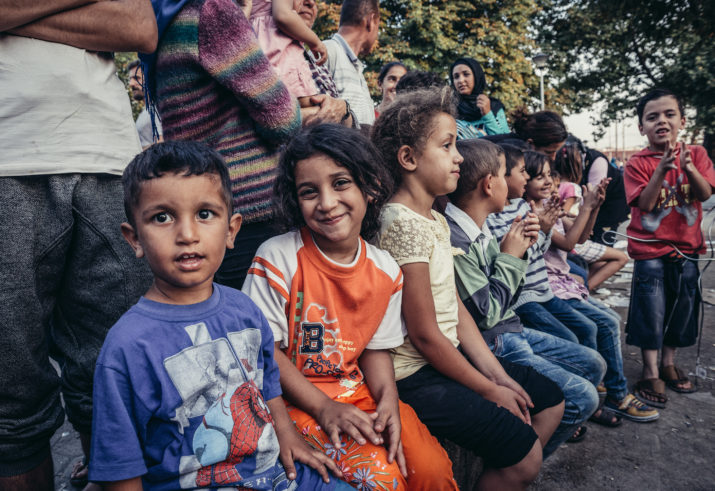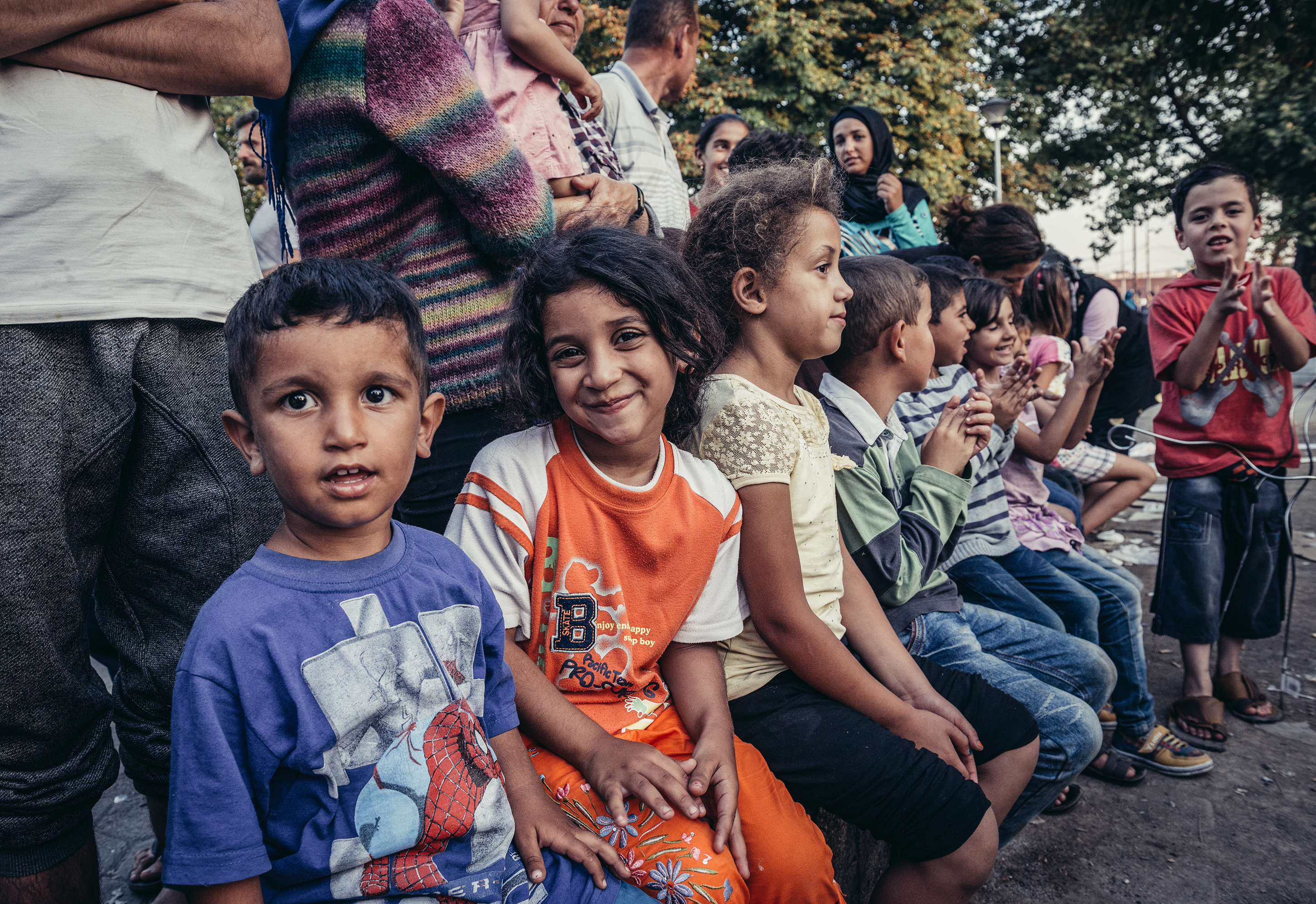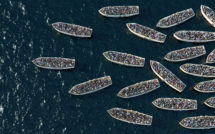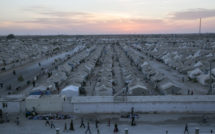

Governments, NGOs, religious relief agencies, and tech innovators across the globe are scrambling to respond to this unprecedented refugee crisis. The Vassar College Refugee Solidarity Initiative was created because we believe institutions of higher learning, such as ours, have a major role to play. If we want to prepare our undergraduate students for this new reality, we need to be a part of researching, analyzing, and designing curriculum innovations that give our students the capacities and skills to engage with what will be global challenge for decades to come. As an institution of higher learning, we are committed to social justice and preparing our students to be engaged global citizens. We are also uniquely placed to act: we have alum networks across the globe, we are connected with institutions of higher learning worldwide, and the digital humanities are providing us with new and unprecedented tools.
I began my efforts at Vassar in September 2015 by first reaching out to the Vassar President and the Dean of the Faculty, who promised to support a greater engagement of the college with the challenges posed by this crisis. At a first “teach-in” in early October, we acknowledged the depth of the crisis, as well as our paralysis, given that the refugee crisis was much older than when we first took note (namely when refugees started arriving in large numbers in Europe). But our teach-in was also a way of inspiring action, and I used examples of Vassar’s engagement during past refugee crises to do so. I discovered in the archives, for example, that in the 1930s, Vassar college president Henry Noble MacCracken founded a program for “Displaced Scholars” that was instrumental in bringing Jewish scholars from Poland, Austria, and Germany to Vassar, and to funnel many others to colleges and universities in the U.S. Vassar students were part of an “Intercollegiate Committee to Aid Student Refugees” (started at Harvard), which raised funds to bring Jewish students from Germany and Austria to U.S. campuses. But Vassar educators also used the refugee crisis to think critically about the role of a vibrant, genuine democracy in confronting the fascist threat. In order to do that, the college brought together Jewish refugee students, Vassar students, union leaders, and African American civil rights groups in a summer “Work Camp for Democracy” to learn together and from each other. In preparation for the anticipated refugee crisis after WWII, Vassar faculty organized a “Committee on Reconstruction” to think about how to aid in rebuilding the lives of Displaced People after 1945. After the war, many of Vassar’s faculty went to Europe to work in reconstruction and democratization projects. Professor Alma Molin, whose line I now fill, for example, went to West Germany for many years after 1945 to work with the reemerging women’s organizations as part of the U.S. effort of democratizing the country after Nazism.
Inspired by these examples from the college’s past, Vassar students called for greater campus-wide engagement and organized teach-ins at every dorm. As a result of these meetings and discussions, a group of students and I founded Vassar Refugee Solidarity in October 2015. Another outcome of the campus wide teach-ins was the students’ call for an academic class that would educate the campus more thoroughly about the crisis. I put together “The 21th Century Worldwide Refugee Crisis,” a six-week pop up class that attracted some one-hundred forty students and about twenty members of the larger Poughkeepsie community. Colleagues from philosophy, political science, education, economics, geography, and environmental studies brought their expertise into my classroom, and Vassar librarians designed a fantastic research web site for the students. I also brought advocates for refugees, such as the director of IRIS, a resettlement agency in New Haven advocates from Scholars at Risk; two scholars—one from Syria and one from Eritrea—who have found refuge in the U.S. under the auspices of that organization; as well as Kristin Rehder, a photographer who has been chronicling the lives of refugees resettled in Lancaster, PA.
The class culminated in a week-long refugee solidarity week that included fundraisers, lectures, and an exhibition of the twenty-six group research projects on past refugee crises produced for the class. Students in Vassar Refugee Solidarity also built a website that serves as a digital archive and go-to portal for anybody in higher education interested in getting involved.
The class also convinced the Vassar Refugee Solidarity team led by Anish Kanoria that the current refugee crisis called for new responses that go beyond humanitarian relief. Existing models for humanitarian aid, developed during World War II to address the displacement of millions of people during and after that war, are based on the hierarchical vision of that time and the immediate needs of displaced persons: safety, shelter, healthcare, and sustenance. Lacking in much of that vision were the educational needs of displaced people. It became clear in our deliberations also, that the existing vertical structures of the past needed to be replaced with horizontal and more egalitarian models of global and transnational educational solidarity.
Starting conversations with the Vassar president to secure scholarships for refugees was a first step, but we also saw great promise in the digital humanities. In the age of the Internet, smartphones, access to digital hotspots in refugee camps, and Internet cafés available to urban refugees, institutions such as Vassar can use these tools to connect with the displaced across the globe. We did some initial investigations with universities in Europe to consider possible new models of how to connect our students with “people on the move,” but realized that the less bureaucratic structures at our liberal arts institution allowed us much more flexibility.
What liberal arts institutions such as Vassar also have is a thriving, closely connected and committed alum network, and we were grateful to form a partnership with italki, a global, digital platform of language teachers, founded by a Vassar alum in Shanghai. Italki is like the Air B&B of language learning that connects people world-wide, and they were much interested in exploring a philanthropic component for their platform. Despite innumerable and frustrating bureaucratic obstacles related to refugees’ lack of access to reliable internet, work permits or bank accounts, Elise Shea, the student leader for the digital project pushed on. In Fall 2016, Vassar students enrolled in Intermediate and Advanced Arabic language classes had a first opportunity to have live conversations with Arabic-speaking refugees via italki, and our Arabic language instruction teachers will continue to include these exchanges in future classes.
Elise and her fellow student leader Jessica Schwed developed this pilot as a mode of transnational language exchange, which seeks not only to improve language skills, but also to foster dialogue, enduring connections, and the opportunity to humanize the refugee crisis. Another key benefit of this program is that the refugees receive payment for their services, providing them with a first opportunity to make their own money. At the same time, the tutoring set-up reverses the power relation of the more traditional aid package: the refugee student is the expert and teacher, and our students benefit from the refugee’s expertise. Currently, we have established language partnerships with Small Projects Istanbul, AdDar Community Center, Istanbul and the Refugee Academy, Berlin Refugee Academy, Berlin. In January 2017, Elise worked with the NGO Echo100 Plus in the Ritsona and Leros refugee camps in Greece to set up an italki hub (Vassar donated a laptop). Sophia Slater, another member of Vassar Refugee Solidarity has been using her Junior Year Abroad in Paris to write articles on the Calais refugee camp for Newsweek Magazine and to set up a provisional itaki hub together with a Vassar alum living in Paris. We see great promise for the italki initiative since the company has agreed to scale up this program for other interested schools.
A second aspect of Vassar’s Refugee Solidarity Initiative is refugee resettlement to the U.S. Soon after organizing, students were dissatisfied with our initial, sole focus on educational initiatives to respond to the crisis. They were inspired by Chris George, the director of IRIS, a refugee resettlement agency in New Haven, who had come to speak in our 6-week class, and also Kristin Rehder’s powerful photos chronicling the lives of resettled refugees in Lancaster, PA. After a series of consultations with Chris George, Vassar Refugee Solidarity decided that a co-operation between Vassar College and local faith based groups would be an innovative and ideal model to facilitate the resettlement of refugees to the Mid-Hudson region. In order to do that, however, a resettlement office to coordinate the resettlement process under the auspices of the Department of State was necessary. In spring of 2016, Vassar Refugee Solidarity reached out to Church World Service (CWS) to ask if they would consider opening an office in our area, and to offer our support in urging government officials in Albany, NY and the U.S. Department of State to permit the opening of such a refugee resettlement office. In order to bolster CWS’s application, Vassar Refugee Solidarity met with local faith leaders and convinced a mosque, synagogue and church to co-sponsor one refugee family each. Since March of 2016, our initiative, together with a growing interfaith network created by this effort laid the foundation for a robust resettlement infrastructure, with additional faith-based groups pledging to co-sponsor families. In early October CWS received permission from the State Department to open a refugee resettlements office in Poughkeepsie, and the first refugee families will be arriving in late January 2017 from the Democratic Republic of the Congo, Syria and Iraq.
As elated as we were by our progress, the sheer scope of the crisis convinced us to reach out to fellow institutions of higher learning to assure a larger impact. Marist College, SUNY New Paltz, Dutchess Community College, Bard College, Mount Saint Mary College, and the Culinary Institute of America have now joined together in our newly-named and still growing Mid-Hudson Refugee Solidarity Alliance. The schools in this educational alliance have committed their institutions to work with faith-based and civic groups in resettling families, and to engage their students in on-the-ground work and shared learning with resettled families. This is the first time in our region that institutions of higher learning, with such differing educational missions and student bodies are working together for a common goal. We bring different strengths and resources to this hands-on project, but all of these different contributions are key to assuring the success of our project. Students in our alliance will be working closely with CWS, local faith-based and civic groups, as well as existing social justice agencies to make the Mid-Hudson Valley a home for our new neighbors. Students are eager to step up and do their share: fundraising, furniture drives, language tutoring, accompanying refugees on doctor or governmental office appointments, paperwork, translations, homework assistance for children, social programming such as sports or theater, web development, or research for local service agencies with limited funding. Student interns from our allied schools will also assist the CWS Poughkeepsie office.
A third initiative growing out of the Vassar Refugee Solidarity initiative is the Consortium on Forced Migration, Displacement and Education, made up (for now) of Vassar, Bard, Bennington, and Sarah Lawrence colleges. The consortium believes that institutions of higher education have a responsibility to research, analyze, and design solutions for the urgent problems created by the refugee crisis, and to give our students the capacities and skills to engage with diverse communities. We agreed that students in each of our colleges should have access to a curriculum that integrates theory and practice related to the forced displacement and migration of refugees. To be true to our commitment to the liberal arts and interdisciplinarity, this curriculum will include the study of human rights, the history of forced migration, the emphasis on learning and translating languages, and the social practice of the arts.
Fortified by a generous planning grant from the Andrew W. Mellon Foundation, we are developing four curricula—appropriate for each of our institutions—that provide a broader historical and moral context for forced migration and displacement in general, and how to respond to the ongoing crisis in particular. Equally important to our curriculum development initiative is the identification of new educational opportunities that allow our students to translate the liberal arts values and commitments that we teach into socially aware, culturally sensitive, and committed action. These “social justice engagement” classes will provide not only a theoretical grounding in issues related to forced migration, but also will ensure that students’ efforts will extend outside the classroom, working closely with local service agencies and civic or faith-based groups that deal with issues of forced migration and displacement, including also individuals who have fled war, violence or poverty in South and Central America.
The social engagement component of our planned curriculum will also need to prepare our students to engage with refugee populations outside the U.S. We have started conversations already to build on our institutions’ existing study-abroad programs to bring our students to locales, such as Germany, Italy, Greece, and other European countries where migration crises are playing out. In order to do so effectively, our students will need to develop even more vigorously trans-lingual as well as trans- and inter-cultural communication skills. A close collaboration between the social sciences and the humanities is called for; with a renewed emphasis on European language learning, the study of European history, national cultures and common institutions, as well as the seventy-year history of the transatlantic alliance. The Consortium committed itself to sharing resources, speakers, and access to their diverse JYA programs.
For us at Vassar, Bard College Berlin’s innovative and exemplary Program for International Education and Social Change will serve as the physical anchor during our developmental year. Participation in a semester abroad will help our students gain more specialized knowledge about the European theater of the global refugee “crisis” and give them the chance to engage in work directly with local refugee communities. Sarah Lawrence is in conversation with DIKEMES International Center for Hellenic and Mediterranean Studies in Athens to develop a locale in Greece for our students. Conversations are also underway with the University of Bologna (through Vassar) and the Robert F. Kennedy Center for Justice and Human Rights Training (through Bennington) as viable partners for our consortium students. Our programs abroad will integrate theoretical learning with applied praxis to educate and engage our students with the particular challenges of certain locales and specific national contexts.
As we develop our curriculum pilot at Vassar over the next year, we will include our allied educational partners in the Mid-Hudson Refugee Solidarity Alliance in our deliberations. We will also be working with colleagues from other liberal arts colleges who are members of the Alliance to Advance Liberal Arts Colleges, which is also supporting curriculum development in response to the refugee crisis with a grant. Once fully developed and institutionalized, our curricula could serve as a model for other liberal arts colleges seeking to engage their students in similar ways.
Given the scope of the forced displacement, institutions of higher learning have a moral obligation to be engaged and to prepare their students for this daunting challenge. Liberal arts colleges, with commitment to social justice and their long-standing tradition of educating leaders for an ever more complex and interconnected world, have a vital contribution to make. Now, more than ever, given the ominous anti-democratic impulses and political developments both in the U.S. and Europe, educators and students need to speak up and get involved.
Click here to learn more about the Vassar College Refugee Solidarity Alliance.
Maria Höhn is the Marion Musser Lloyd ’32 Professor of History at Vassar College. Her book GIs and Fräuleins (University of North Carolina Press, 2002) was the first book to address the experiences of African American soldiers in Germany. A Chinese translation of this book is forthcoming in 2017. She co-authored and co-edited Over There: Living with the U.S. Military Empire from World War II to the Present (Duke University Press, 2010). A Korean translation of that book will be out in early 2017. She is also the author of A Breath of Freedom. African American GIs, the Civil Rights Struggle and Germany (Palgrave 2010), which was published in German in 2016. A Smithsonian TV produced documentary, “Breath of Freedom,” based on her research was shown in the US and Germany in 2013. She is the recipient of prestigious grants from the Mellon Foundation, the National Endowment for the Humanities, the German Historical Institute, and the American Philosophical Society. Together with a group of Vassar students, she founded Vassar Refugee Solidarity and the Mid-Hudson Refugee Solidarity Alliance.
Further Reading:
Integrated Refugee and Immigrant Services
Program for International Education and Social Change
Alliance to Advance Liberal Arts Colleges
This is part of our special feature Forced Migration, Cultural Identity, and Trauma.
Photo: Belgrade, Serbia | Shutterstock
Published on February 1, 2017.




